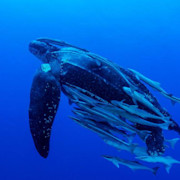- Science News
- Featured news
- Rachel Ann Foster – Don’t wait for change
Rachel Ann Foster – Don’t wait for change
Author: Anna Farrall
Dr Rachel A. Foster is a Specialty Chief Editor for Aquatic Microbiology in our journals Frontiers in Microbiology and Frontiers in Marine Science. Dr Foster was a Lead Scientist at the Max Planck Institute for Marine Microbiology, and after being selected as a Wallenberg Academy Fellow, she now leads her own research group at Stockholm University. In this blog, we discuss Dr Foster’s career, how she got to where she is now and the challenges faced along the way, as well as her advice for those entering academia.

Photo credit to: Magnus Bergström, The Knut and Alice Wallenberg Foundation
What is the current research focus of your lab at Stockholm University?
“My group works on the microbial partnerships or symbioses between eukaryotic microalgae and prokaryotic bacteria. Many of these partnerships play an important role in biogeochemical cycling of carbon and nitrogen and are also evolutionarily interesting. Few of these symbioses have been cultured, and so there are many open questions. For example, how diverse the partners are, how the partners interact, sustain, exchange, and compete for shared substrates, and their contribution to global carbon and nitrogen cycling. We also develop and adapt single cell methods to study these fascinating populations.”
What drew you to the field of marine science and how did your academic career evolve?
“My childhood summers were spent with family at the Jersey shore in the United States and I was particularly lucky to spend many summers with my aunt. She was a marine biologist, and she ignited my interest in the sea. My grandmother also had this amazing seashell collection and I spent rainy days at the shore admiring the shells.
“Initially, I didn’t know what I wanted for a career. When I attended the University of New Hampshire, I changed my degree many times. I started with French, and briefly changed to Political Science and then Theatre, until I rediscovered Marine Biology. I had terrific professors who had travelled the world, shared their personal research experiences, gave me internships, and truly inspired me. A few years after graduation, I volunteered on my first oceanographic expedition that set me on track for graduate school. After completing Master’s degree studying copepod behaviour, I spent a summer as a farm hand while I deliberated my next move!
“I decided farm work was much harder than graduate school, so I returned to study for my PhD which focused on planktonic symbioses, then I was a postdoctoral researcher at the University of California, Santa Cruz. I have always been fascinated by single cells, linking individual observations to various types of quantitative data. In fact, I think observation is one of our most powerful methods - it is at the microscope where I get most of my ideas.”
What is your proudest professional accomplishment?
“Establishing my own research group was a particularly proud moment in my career. Although this itself was a challenge, one observation that I have made is that it’s one thing to be a leading researcher in the field, and entirely another thing to manage and lead a research team. It is important to offer management and leadership training to those entering academia so they can be prepared for such roles.
“Also, I am proud to have recently applied for promotion to professor, let’s hope I pass!”
Have you faced any challenges or setbacks as a woman in your field?
“Yes! I am fortunate to work in a country that allows me to take care of my kids and have my professional life as it’s important, yet challenging, to maintain a work-life balance. But even here in Sweden, there are few women in higher positions within science. I have experienced throughout my career being one of the few women in the room, which can feel like an accomplishment, but it often feels lonely. There have been instances of harassment, but you learn to avoid them. Contracts have ended earlier than expected too, but you learn to move on and continue to be successful.
“I initially found it more difficult to publish as my own research team leader without some of my former established male colleagues on the paper. It feels strange because, in my opinion, I am still doing the same quality science as before, just now on my own.”
What needs to change, or be improved, in academia to be more inclusive?
“We need to find a system of comparison that is equal and not based solely on metrics or citations. There are so many aspects of our job that cannot be easily scored, like supervision, mentorship, training, teaching, and countless hours of admin. We also need to start earlier at including and keeping minorities, starting in high school, for example. This is something I hope to change in my own local community.
“Another strategy could be policy changes. For example, at conferences more attention could be paid to making a more equal representation of speakers. This is something I have seen much progress in. Postdoctoral positions and funding should have longer contracts. Typically it is two years in Sweden but, given the slow review process, it is quite hard to get the research done, papers written and published within the time limit, while also planning for the next move. Some discuss policies that would limit access to funds for institutions that don’t make progress towards a more inclusive faculty. But here, it is important to recognize that adding more minorities doesn’t mean they will be successful. We need to provide support, like leadership programs, to help new researchers have the skills not just to survive or get by, but to succeed, enjoy the ride, and not be stressed all the time.
“A good start would be to admit there is a problem, and not just wait for another generation to change it.”
What is a key lesson or message you would like researchers in your own lab to take away from their experience?
“There are a few! First, we can accomplish more together than we do alone. Therefore, much of the work in my lab is in small teams. Each person has their individual projects, but we work collectively on overarching goals. This way we share information, transfer knowledge, and capitalize on our collective resources. Learn from each other, be kind and inclusive of each other’s ideas, backgrounds, and approaches.
“Another key message is to acknowledge and show respect to those that help and guide you. Learning from mistakes is one of my own greatest lessons in my personal life, and it has also played a major part in my research. Finally, work hard, it does pay off and it can be an incredibly fun adventure!”
What advice can you give to women just entering the world of academia?
“Build a network of support around you. Don’t be afraid to ask for help when you need it, and support other women and minorities, even if you are never recognized for it. Speak up when you can and choose your extracurricular work activities wisely: do what you enjoy, not what you think is good for your CV. Perhaps, the most valuable advice I received was to say ‘no’ more often, we cannot do everything we are asked. But say ‘yes’ to things that give you inspiration.”

Frontiers is a signatory of the United Nations Publishers COMPACT. This interview has been published in support of United Nations Sustainable Goal 5: Achieve gender equality and empower all women and girls.
About Frontiers Frontiers is the 3rd most-cited and 9th largest research publisher. We publish groundbreaking discoveries by the world's top experts. Scientists empower society and our mission is to accelerate scientific discovery by making science open. We place the researcher at the center of everything we do and enable the research community to develop the solutions we need to live healthy lives on a healthy planet. Featuring custom-built technology, artificial intelligence, and rigorous quality standards, our research articles have been viewed more than 1.4 billion times, reflecting the power of research that is open for all.







